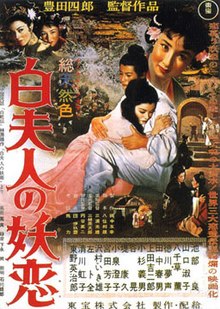The Legend of the White Serpent (film)
This article needs additional citations for verification. (November 2022) |
| The Legend of the White Serpent | |
|---|---|
 | |
| Directed by | Shiro Toyoda |
| Screenplay by | Toshio Yasumi[1] |
| Produced by | |
| Starring |
|
| Cinematography | Mitsuo Miura[1] |
| Music by | Ikuma Dan[1] |
Production companies | |
| Distributed by | Toho (Japan) Shaw Brothers (Hong Kong) |
Release dates |
|
Running time | 102 minutes[1] |
| Countries |
|
| Languages | Japanese Mandarin Cantonese |
The Legend of the White Serpent (白夫人の妖恋, Byaku fujin no yōren, lit. 'The Love of Madame White') is a 1956 romantic fantasy film directed by Shirō Toyoda, with special effects by Eiji Tsuburaya.[1] The film is based on the Chinese fairy tale Pai-she Chuan and the stories Story of a White Snake and White Woman's Magic by Fusao Hayashi.[1]
Plot[edit]
This article's plot summary may be too long or excessively detailed. (June 2017) |
Xu Xian was a poor young man living by West Lake. One rainy day, he got drenched because he didn't bring an umbrella. Bai Niangzi lent him her umbrella and later proposed to him. Xu Xian received two packets of silver coins as wedding preparation money. When he opened them, he found that the silver was stolen goods. After being accused of a crime, Xu Xian was flogged and sent to prison in Suzhou. Fortunately, his brother-in-law spent money to spare Xu Xian from imprisonment. Xu Xian worked at an inn in Suzhou, and Bai Niangzi followed him to Suzhou to express her true feelings and seek Xu Xian's forgiveness. Later, the two lived happily together.
One day, a Taoist priest from Maoshan warned Xu Xian that he had been bewitched by a demon, and his wife was the White Snake spirit. Bai Niangzi punished the Taoist priest. Later, she revealed her true form after drinking realgar wine on the Dragon Boat Festival, which scared Xu Xian to death. Bai Niangzi obtained the elixir of life, but Xu Xian, due to the Taoist priest's instigation, did not trust Bai Niangzi and fled to Fahai for refuge. Bai Niangzi and Xiaoqing used their magic to flood Jinshan Temple. Bai Niangzi was exhausted. In the end, Xu Xian suddenly realized the truth and committed suicide, reuniting with Bai Niangzi in heaven.
Cast[edit]
- Ryō Ikebe as Xu Xian, the young man
- Shirley Yamaguchi as Bai Niang (Madame White Snake)
- Kaoru Yachigusa as Xiao-Qing. Bai-niang's servant, a green snake
- Musei Tokugawa as the selfish Taoist monk
- Kichijiro Ueda as Wang Ming, the moneylender
- Nijiko Kiyokawa
- Haruo Tanaka
- Eijirō Tōno
- Yoshio Kosugi as leader of the guard
- Akira Tani
- Ikio Sawamura as a guardsman
- Bokuzen Hidari
Release[edit]
The Legend of the White Serpent was distributed theatrically in Japan as Byaku fujin no yoren, where it received a roadshow theatrical release on 22 June 1956.[1] The film was released in Hong Kong as Pai-she Chuan in 1956.[1] The film was released in the United States as Madame White Snake by Toho International with English language subtitles in 1965.[1]
Reception[edit]
Mitsuo Miura won the award for Best Cinematography at the Mainichi Film Concours for the work done in The Legend of the White Serpent and Shozo, a Cat, and Two Women.[1] At the 6th Berlin International Film Festival, it won the Honourable Mention (Colour) award.[2]
See also[edit]
- List of media adaptations of the Legend of the White Snake
- The White Snake Enchantress, a 1958 anime film
References[edit]
Footnotes[edit]
Sources[edit]
- Galbraith IV, Stuart (2008). The Toho Studios Story: A History and Complete Filmography. Scarecrow Press. ISBN 978-1461673743.
